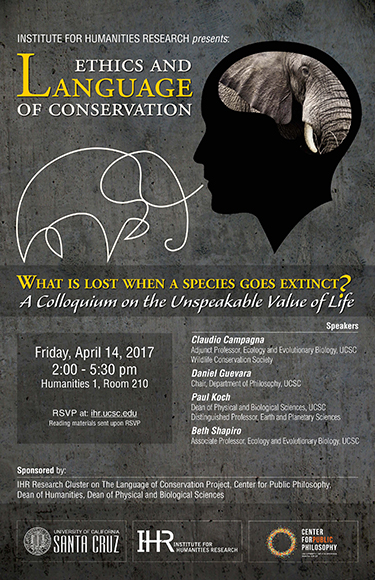Titled What is Lost When A Species Goes Extinct? A Colloquium on the Unspeakable Value of Life, it will be a conversation about the impact of language—how particular words and concepts impact the public’s thinking about topics such as “sustainability,” “conservation,” and “extinction.”
The Language of Conservation is an interdisciplinary research group that seeks to change the way we talk and think about the value of life in all of its diverse forms.
It was launched by program directors Daniel Guevara (chair of the Philosophy Department) and Claudio Campagna (adjunct professor of ecology and evolutionary biology), who believe that the language used by the conservation movement over the past three decades has unintentionally undermined efforts to promote biodiversity--because it reinforces the politically self-serving language of “sustainable development.”
The two professors argue that we have been using the language of economics applied to nature, but that is a language incapable of grasping the value of life—except for its value to human development.
“The language of conservation today--including iconic terms like ‘sustainable development’ and emerging terms like ‘de-extinction’--is an example of what the philosopher Ludwig Wittgenstein called a ‘bewitchment of our intelligence by means of our language,” noted Guevara. “We must identify and battle the confusion this language gives rise to, before we can give authentic expression to the value of nature, and especially to the value of life in all its great diversity of forms.”
“As the great conservationist Aldo Leopold noted long ago: when it comes to nature, we are at the frontier of ‘values as yet uncaptured by language,’ he added.
Both Guevara and Campagna have a great appreciation for the wide variety of ways in which our language and terminology can limit, shape, and often distort our thinking. Campagna has been involved in conservation action for three decades, and Guevara has taught ethics for many years, including environmental ethics.
They will be joined at the April 14 event by Beth Shapiro, associate professor of ecology and evolutionary biology; and Paul Koch, distinguished professor of Earth and planetary sciences, and dean of the Division of Physical and Biological Sciences.
This event is sponsored by the Institute for Humanities Research and the Center for Public Philosophy at UC Santa Cruz. It will run from 2 p.m. to 5:30 pm at Humanities 1, Room 210. Admission is free and open to the public. RSVP at ihr.ucsc.edu.



